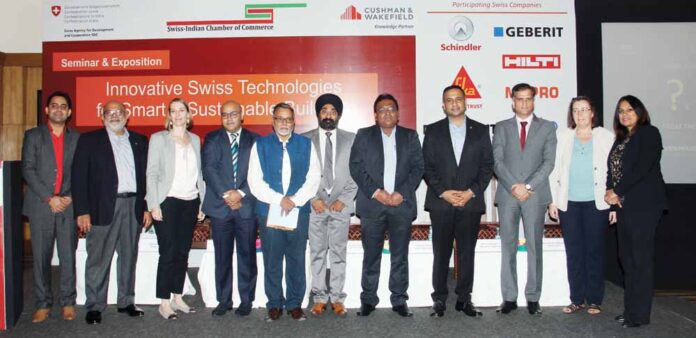For decades Swiss technology has shaped the global real estate landscape, and its impact has been felt in India as well. A seminar on innovative technologies for smart and sustainable buildings, organised by Swiss-Indian Chamber of Commerce (SICC) recently in Bengaluru, brought to light the profound impact the tiny country’s large enterprises have made in India. And in a panel discussion joined by CXOs of Indo-Swiss companies, the concept of lifecycle cost emerged as the new criteria for selecting products and services.
“As a result of the changes ushered in by the Real Estate Regulation Act (RERA),builders are adoptingnew technologies and solutions which are sustainable and cost-efficient, and help in faster construction such as prefab solutions,etc. They are also seriously looking at lifecycle costs instead of limiting themselves to the capital costs,” remarked Geberit managing director Abubaker Koya, who is also president–SICC South.
Forbo India’s managing director Hardeep Singh said, “Swiss companies have taken the leadership position in sustainability over the past many years,and it is time for these companies to bring in their technological leadership to emerging markets.”
Talking about Swiss technology’s support to environment sustainability in buildings, Schindler India’s senior VP-NIBVincent Pintohighlighted innovations in the context of elevators,“The shift from rope to belt has helped in reducing power consumption and in bringing energy-efficiency,while usage of recyclable materials and space saving within the building shaft are other important factors.”
Sika India’s national head-specifications & projects Soumendra Mishra said, “Today’s solutions should envelopestructures and safeguard inhabitants from air pollution even while allowing in natural light, thereby saving energy and meeting low emission standards.”
Hilti’s sales director Mayank Kalra asserted, “When it comes to addressing health, safety and environmental concerns, it is essential that we talk not only about suitability of the products but also consider stability of the entire system.”
Mupro India’s national sales manager Sandeep Kaul said that decadent practices in construction were being discarded. “When a project is envisaged at the designlevel, much of the investment is earmarked for thesuperstructure and not enough attention is given to the services that will runinside the shaft. For instance,rainwater, supply water, drainage, HVAC, and other such utilities are never suitably envisaged at the design stage. However, today the standards in India are indeed evolving.”
Geberit’s national sales manager Gorika Shyam explained how lifecycle costs could be addressed. “RERA has forced the builders to look at lifecycle costs and not just the upfront cost of the building. It is important that we educate designers, architects and developers about the long-term sustainability of our products, and not merely meet theirbudgetary requirement.”
Regent Lighting’s executive director Amol Adlakha said that knowledge dissemination is key to convincing customers, and investments should be made for educating our own people about the value of our products. “In fact building awareness and imparting knowledge via training should be a continuous process.”

